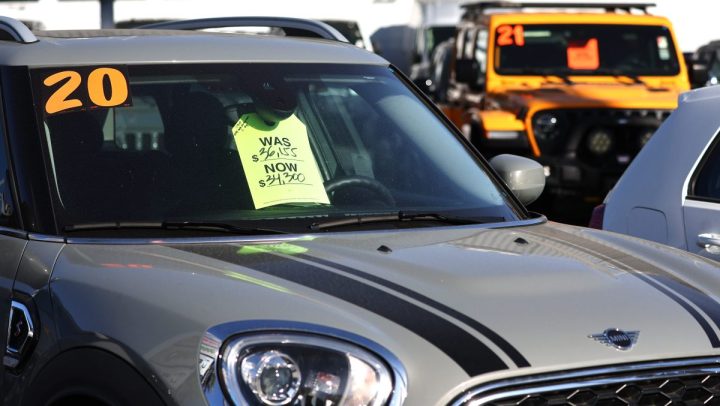
New cars have been a seller’s market, but that’s changing

Anyone who’s shopped for a car during the pandemic knows that sellers have been in the driver’s seat, so to speak.
Surging demand for new cars combined with record low inventories allowed dealerships to mark up prices and left buyers with little power to negotiate.
But things are starting to move back in the consumer’s favor. In March, for the first time in nearly two years, the average new car sold for less than the sticker price by about $171, according to Kelley Blue Book.
What does this tell us about the car market?
Well, a new car’s sticker price is set by the manufacturer. But buyers can haggle that price down or dealers can mark it up depending on market conditions, according to auto analyst David Whiston with Morningstar.
“Lately with the chip shortage, some dealers have, depending on your perspective, either been utilizing the free market efficiently or ripping consumers off,” he said.
A year ago, the average new-car buyer was paying close to $1,000 over sticker price. But with that semiconductor chip shortage easing, some automakers are ramping up production, said Rebecca Rydzewski, a research business manager with Cox Automotive.
“With inventory up, dealers don’t have the pricing power that they once did maybe six months ago,” she said, adding that new vehicles are still much more expensive than before the pandemic, at an average price of just over $48,000.
But more cars on the lot means modest discounts are making a comeback. Jessica Caldwell with the car site Edmunds, said dealers are hoping discounts will incentivize purchases despite high interest rates, which will drive up buyers’ monthly payments.
“We’re having consumers really stop and think, ‘Do I really need a new vehicle?'” she said. “You know, ‘Cars are very expensive right now, I’m not sure what’s happening with the economy. I’m a little worried about my job.'”
David Whiston with Morningstar is one of those consumers sitting on the sidelines of the vehicle market. His household could use a second car, but he said it’s not urgent.
“I just decided I’m going to wait for a much better buyer’s market. You can call me cheap if you want,” he joked. He’s hoping that more favorable market will come late this year or early next, whenever the chip shortage finally comes to an end.
There’s a lot happening in the world. Through it all, Marketplace is here for you.
You rely on Marketplace to break down the world’s events and tell you how it affects you in a fact-based, approachable way. We rely on your financial support to keep making that possible.
Your donation today powers the independent journalism that you rely on. For just $5/month, you can help sustain Marketplace so we can keep reporting on the things that matter to you.

















